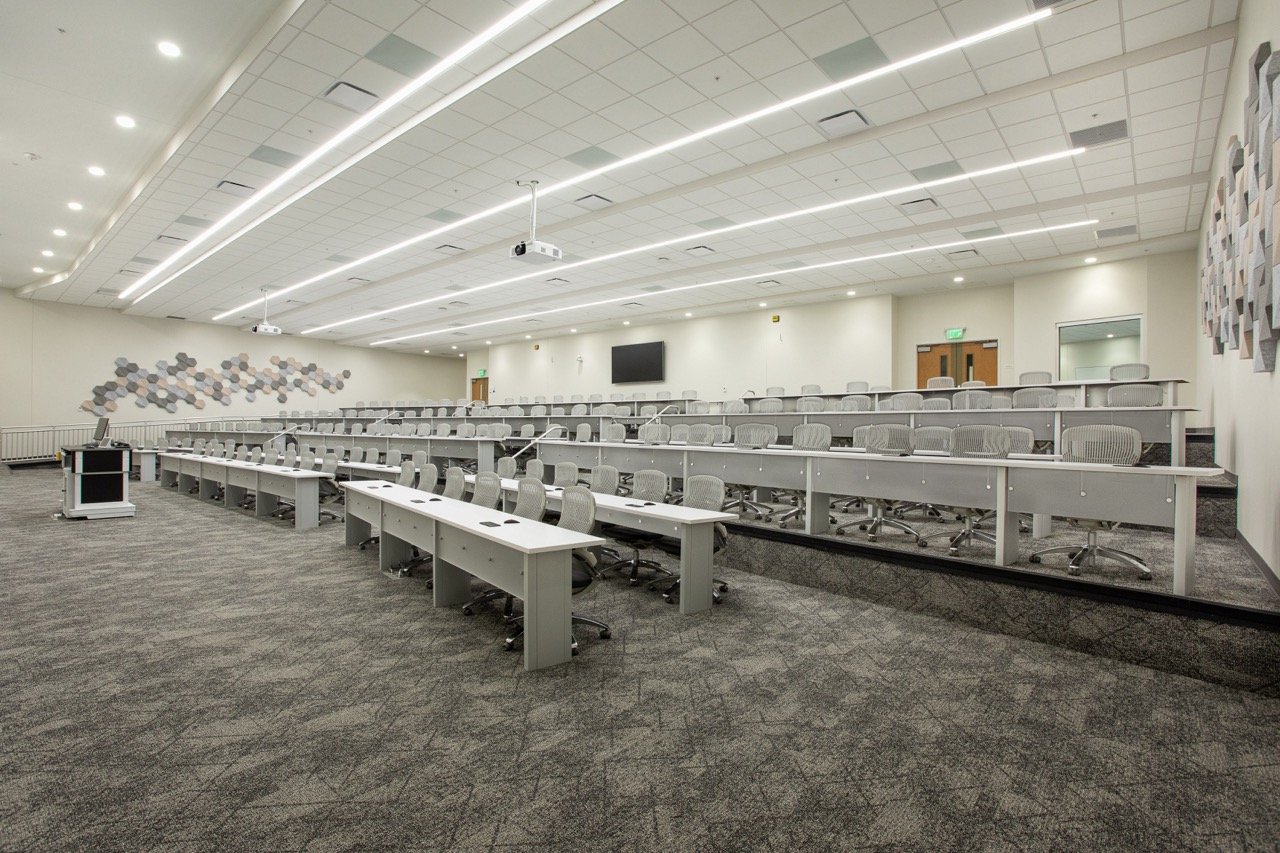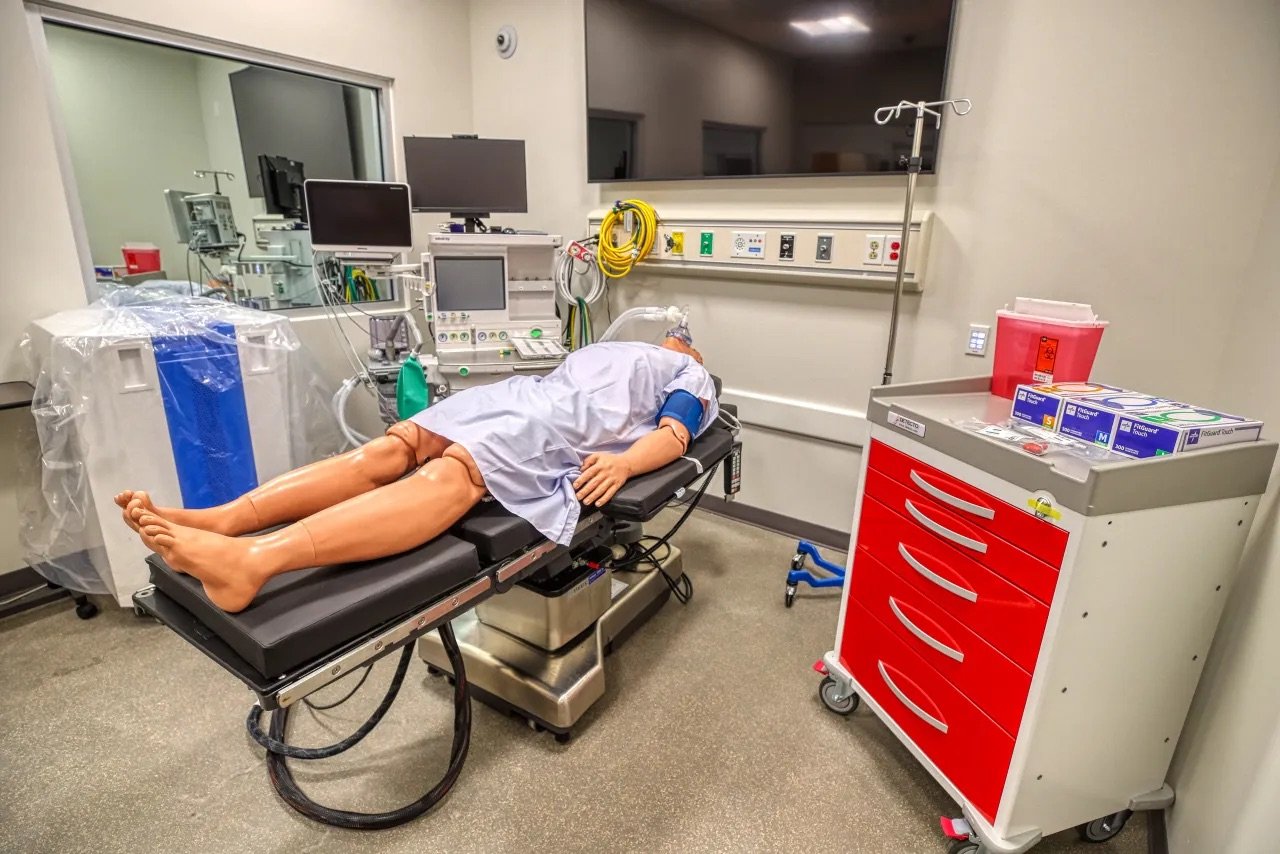
Curriculum
OCOM offers a curriculum that covers two years of didactic training on campus, followed by two years of clinical rotations throughout the state of Florida.
Additional Curriculum Department Information
Curriculum Philosophy & Strategies
OCOM will award grades on a Pass/Fail grading system. We advance our mission through a carefully planned systems-based curriculum that takes an evidence-based approach to educating osteopathic medical students and incorporates the following:
• Active Retrieval/Frequent Assessment;
• Spaced Practice, Interleaved Learning and Practice, and Spiral-Based Education;
• Variation of Learning Strategies;
• Effortful/Active Learning;
• Integration of Elaboration, Generation, Reflection, and Learning Devices; and
• Use of Multiple, Objective Measures to Provide Timely Feedback on Learning.
To accomplish these principles, we implement the following strategies:
A systems-based approach integrating clinically applicable biomedical science concepts into the clinical application of medical knowledge;
Use of a combination of: Case-based learning; Flipped classroom education; Team-based learning; Formative assessments; Active assessment practices (question banks); Simulation-based learning; Weekly quizzes/assessments; Ongoing summative assessment/learning consolidation and Objective structured clinical examinations (OSCEs) throughout the curriculum.
Patient-Centered Education
Patient-centered education is used throughout the OCOM educational model, where all aspects of medical education integrate the biomedical sciences and are applied to clinical scenarios to garner higher learning outcomes using critical thinking led by experienced clinicians. Vertical and horizontal integration facilitates linkage between course and clinical work across the four years of the curriculum. We believe strongly that the clinical application of basic and biomedical sciences offers a superior approach to traditional learning approaches, such as straight recall. By having in place admission pre-requisites, we do not need to recreate undergraduate courses in our curriculum; rather, we create just-in-time learning opportunities to ensure that all students are prepared for clinical discussions.
Vertical integration refers to interweaving clinical skills and knowledge into the basic science years and, in turn, reinforcing basic science concepts as they apply during the clinical years. Horizontal integration refers to identifying concepts or skills, particularly those that are clinically relevant, that cut across the basic sciences, and then using these as an integrated focus for learning sessions, clinical scenarios, and course materials.
Curriculum Development
OCOM faculty members develop the curriculum with input from the larger college Curriculum Committee and the Department Chairs and Course Directors. Integration is ensured by Course Directors and Course Teams of subject matter experts (individualized for each course) overseeing the appropriateness of the content. A Course Leadership Liaison assists in the organization and operationalization of the curriculum and supports the Associate Dean of Pre-Clinical Education in ensuring that faculty have the tools they need to succeed in delivering their content to our students.
Curriculum Committee
Frequently Asked Questions
-
The curriculum is developed to prepare students for the challenges of residency and the profession of Osteopathic medicine, as well as the realities of passing medical licensing examinations. It is based on the AOA's Seven Core Osteopathic Competencies and takes a systems-based approach that incorporates spaced retrieval of basic and clinical sciences as they are applied to clinical cases.
-
There are no lectures in the traditional sense. Instead, students will be directed to modules for learning material prior to group meetings, where they apply what they learned to a clinical case. These modules may be online lectures, assigned articles, sections from textbooks, or other resources. Therefore, OCOM’s curriculum will consist of self-directed learning sessions that are predetermined to prepare the students for applying learned material to clinical cases.
-
Understanding and mastery of basic science material is critical to the profession of medicine. For this reason, basic sciences are learned during each systems course through self-directed sessions, then applied to many clinical cases throughout the preclinical curriculum. Because the underlying mechanisms of disease have commonality among different cases, students will recall what they learned from systems courses and build upon their foundational knowledge as they work through the basic science mechanisms causing the clinical findings in each case. This method allows complete integration of all the basic sciences throughout the curriculum. Anatomy will be introduced in the very beginning during a “Foundations” course, then integrated and reapplied throughout the entire preclinical phase.
-
The curriculum at OCOM has been carefully crafted to form a firm, stable scaffolding of knowledge upon which students can build their own individual knowledge outward through vertical and horizontal curricular integration in the first two years of the curriculum. The curriculum employs a spiral method of assessment and delivery in which a concept may be learned and applied to a clinical case in the spring of year 1, but may be a mechanism in a CBL case in spring of year 2, necessitating students to continually review past information as they apply the underlying mechanisms to current cases. This leads to mastery of information through repeated application to the point where they are able to seamlessly transition from on-campus to hospital-based education, and also excel on the COMLEX-USA examination series.
-
The educational style we have built our curriculum around is called andragogy, which is an adult learning principle that supports self-directed learning, inquiry, and discovery, while providing pedagogical guideposts and opportunities to apply knowledge longitudinally. For instance, CBL sessions will be facilitated by faculty who are experts in their field, and these cases will challenge our students to work in groups to apply the knowledge gained from self-directed learning to clinical/patient-based scenarios in order to prepare students for the realities of clinical medicine and support their development into a strong year 3 & 4 clinical student and future physician.
-
Assessment at OCOM will be done weekly in the form of quizzes, and episodically in the form of examinations, with examinations in the Consolidation courses being spiral and cumulative over all content learned throughout the previous courses at OCOM. Students are also given formative assessment as they apply information to clinical cases in CBL sessions through student interaction and observation. Examinations will challenge students to integrate knowledge into clinical contexts, mirroring year 3 rotations, and questions will be designed similarly to those found on the COMLEX-USA. In the systems, exams will occur at the end of each system, and for systems of 4-week duration or greater, at the half-way mark in the course. Clinical Skills, Clinical Simulations, and OPP courses will include a combination of formative feedback, lab practical exams, and OSCE exams which will vary throughout these longitudinal courses.
-
The best way to visualize the Foundations Course is a clinically-oriented approach to basic science knowledge presented in a clinical context to prepare students for the systems-based education to come. In that vein, it is dissimilar to most content covered in an undergraduate curriculum.
-
The study of anatomy is the study of anatomical structure in 3D space. This can be accomplished in multiple modalities. At OCOM, we utilize the power of virtual anatomy platforms, anatomical models, human simulators and other innovative tools to allow for total integration of anatomy as students apply and discuss anatomical structure during each CBL session, Clinical Simulation experience, and OPP laboratory. In this model, the study of anatomy is interwoven throughout the 1st two years of medical education. This method reduces learning minutia and promotes retention and mastery of material, rather than rote memorization.
-
CBL is the cornerstone of basic science education in our curriculum where students learn basic sciences, then apply them to the underlying mechanisms discovered during a progressive disclosure model of a clinical case study. This is done in a facilitated model where one faculty facilitator discloses a clinical case progressively as students work on answering all the why’s, what’s, where’s, when’s, and how’s of the clinical findings in the case. Students work together in groups of 6-8 students as they apply what they learned to the clinical picture.

Example Student Schedule
This is just an example and is subject to change.
















